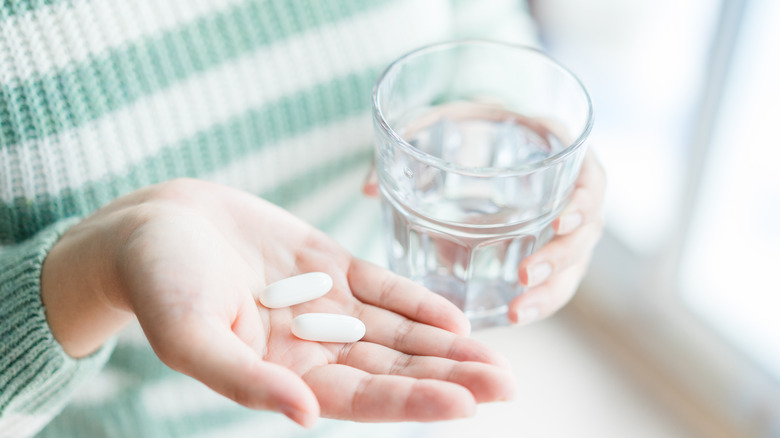Why You Should Think Twice About Taking Painkiller Meds Before The COVID-19 Vaccine
The widespread availability of the COVID-19 vaccine is both exciting and a little scary. It's exciting when you think of the craziness that was 2020: the hours spent stuck at home, the long supermarket lines, the cleaning frenzy, and most of all, the fear of becoming seriously ill from something as simple as visiting a friend or attending church. Scary, because it's a new experience. We're used to getting flu shots or tetanus boosters, but not a just-approved vaccine, so we don't know what to expect from that jab of Pfizer, Moderna, or J&J.
Odds are, you already know at least one person who has had both doses of the COVID-19 vaccine. You may have heard of the common side effects associated with the shot, including arm soreness, fatigue, fever, chills, and muscle aches (via CDC). If you're about to get your first or second inoculation, it might seem like a wise move to take a painkiller like aspirin, acetaminophen, or ibuprofen before your visit to keep the aches and discomfort at bay. But when it comes to this particular vaccine, experts say you're better off not trying to ward off pain before the shot. Here's why.
Painkillers may make the vaccine less effective
The COVID-19 vaccine works by signaling the body's immune system to produce the antibodies needed to fight off the contagious virus. Taking painkillers just before receiving the shot may reduce that immune response and make the vaccine less effective, according to researchers. Dr. Gregory Poland, director of the Vaccine Research Group at the Mayo Clinic, told WebMD, "After receiving the vaccine, if one develops symptoms that they feel they want to treat, it's fine, but ideally not before."
However, if you normally do take a pain reliever for an existing condition, it may be advisable to continue taking it as usual; talk to your doctor. The federal Centers for Disease Control (CDC) also recommends not taking antihistamines before your appointment, because this may make it more difficult to tell whether you're suffering an allergic reaction to the shot.
Once you've had the vaccine, it's fine to take medicine if you do experience aches or fever. Vanderbilt University infectious disease expert Dr. William Schaffner told US News & World Report that Tylenol is the recommended remedy for COVID-19 vaccine side effect symptoms. The CDC also suggests non-drug solutions, such as relieving arm pain with a cool, wet, clean washcloth over the area. Fever is a sign that the immune system is working well, so you may want to try drinking fluids and dressing lightly rather than rushing to take a fever reducer.
In any event, any discomfort following the vaccine should go away in a few days. If it doesn't, call your doctor.

